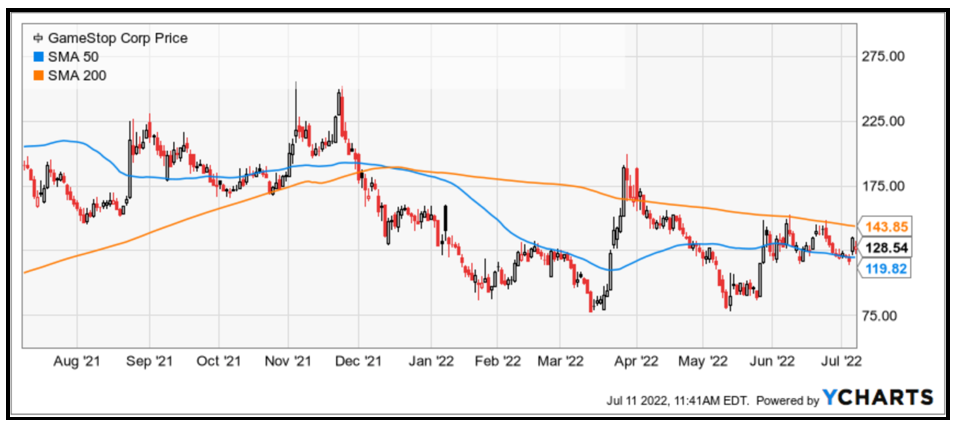Shares of GameStop (GME) shot up 15% on Thursday after executives announced a 4-for-1 stock split. The next day, the company fired its chief financial officer, which is a definite red flag.
For one thing, stock splits don’t predict any price action on a company’s stock. For another, GME receives a Weiss Rating of “D,” which despite the meme stock mania of 2021, makes more sense now than ever.
For the first time in a year, it might be safe to bet against GameStop.
I’ll start with the obvious: Short selling is hard work. Getting the fundamentals correct isn’t nearly enough to ensure trading success, especially when the bet is against the long-term trend for stocks. Understanding the larger trend is key.
Related post: Pathway to Tech Turnaround
GameStop is a fundamentally flawed business. The company’s 4,573 stores sell new and used video games and merchandise across the United States, Canada, Europe and Australia.
Unfortunately, the video game world has moved on to digital distribution. Games are downloaded or increasingly streamed directly from the cloud. There’s almost no need for physical games, nor the infrastructure to distribute them. GameStop is an analog business in a digital world.
Bears get it. And yet since 2019 they’ve mostly been destroyed.
The Dallas, Texas-based retailer was the subject of an epic 2021 short squeeze. Shares zoomed up 1,500% during two weeks in January after so-called meme stock traders on Reddit coordinated to target professional short sellers. CNBC reported that Melvin Capital, a hedge fund, lost billions.
Losing is commonplace for bears, yet you would never know this from listening to the pundit class. Bears talk a good story, and their voices gain pertinence in the financial media when stock markets are falling. Their track records tell the real story, and it’s not pretty.
Gordon Johnson is a noted Tesla (TSLA) bear. He has become a go-to source for the bearish viewpoint on the electric vehicle maker. Johnson reasoned during 2017 that Tesla was doomed, and that it’s only a matter of time before shares collapsed. Adjusted for stock split, the stock was then trading at $56 per share. Today shares of the EV titan fetch $752.29.
Related post: Shock Bankruptcy Shows Dark Side of Tech SPACs
Even Jim Chanos, the famed short seller who predicted the collapse of Enron, has a spotty record.
Chanos is a gifted analyst, with a keen eye for financial sleight of hand and lousy business models. In 2021, the 65 year-old founder of Kynikos Associates predicted shares of DraftKings (DKNG) and DoorDash (DASH) were headed for imminent collapse because they couldn’t make profits in the best of times. Both calls turned out well for Kynikos. However,Institutional Investor reported in April 2021 that his fund lost 50% of its assets the previous year.
In fairness, stock prices are so much more than economics and a strong gut feeling.
Shares can rise exponentially when investor sentiment is bullish. Crowd psychology encourages irrational exuberance, like screaming until your voice is hoarse at a sporting event or buying into questionable investments because everyone else is doing it. The investment adage, “when the wind blows strongly enough, even the turkeys fly,” is legit.
Wall Street is an aiding abettor.
Analysts at RBC Capital Markets said in December that DoorDash shares were set to outperform the market and were worth $260. The firm says today that investors should expect no more than $142 during the next 12 months. Getting there would be amazing. DoorDash stock currently trades at only $74.96.
Sure, lockdowns ended, and the global pandemic subsided, but that was predictable in 2021 … at least it should have been.
The real change is investor sentiment.
The tailwinds that lifted stocks have become headwinds. Investors say they’re worried about inflation, corporate earnings and the Fed. But mostly, they’re just worried other investors will keep selling shares. Exuberance has been replaced with fearful inertia.
GameStop is still in a really bad position. Firing the CFO when the business is underperforming usually means impending crisis. The company has missed its forecast earnings estimates in each of the last four quarters. Net income reported in April tumbled 136.4% year over year, to a loss of $157.9 million.
At a current price of $128.54, the stock could easily fall to $80 or lower during the next 12 months.
Savvy investors would be wise to avoid the company’s stock.
One last thing …
For nearly 100 years, average investors were forbidden from investing in “Alpha Round” deals — the earliest pre-IPO funding that produces the biggest returns. But new laws have opened these deals to everyone.
This month, Weiss Ratings is diving into this exciting new frontier of the market. On July 19, join Dr. Martin Weiss for the Alpha Round Investing Summit to seize this historic opportunity and claim first access to a special Alpha Round deal with Weiss Ratings!
Click here to reserve your spot for free.
Best wishes,
Jon D. Markman


